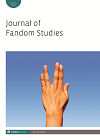- Home
- A-Z Publications
- Journal of Fandom Studies, The
- Previous Issues
- Volume 2, Issue 2, 2014
Journal of Fandom Studies, The - Volume 2, Issue 2, 2014
Volume 2, Issue 2, 2014
-
-
Fandom studies as I see it
More LessAbstractResponding to the recent issue of Journal of Fandom Studies focused on Textual Poachers at 20, this article explores the roots of fandom studies, the value of public-focusing scholarship and the importance of broadening the topics that fandom research explores.
-
-
-
Customized action figures: Multi-dimensional fandom and fannish fiction
More LessAbstractOne-sixth scale action figure customization warrants more extensive cultural analysis, for three reasons. First, action figure fans express their interests in multiple fandoms simultaneously, thus enabling more multi-dimensional analyses within fan studies. This article defines and discusses the action figure fan practices of Mini-Me figures and photostories in order to illustrate fandom’s multi-dimensional nature. Secondly, action figures, especially Mini-Me figures, reveal new aspects to fans’ relationships with transitional objects. Finally, Mini-Me figures and photostory narratives offer a means to address a previously unstudied genre: fannish fiction. ‘Fannish fiction’ includes original narratives produced by fans incorporating frequently multi-dimensional genres, tropes, and so forth popular with fans. However, unlike fan fiction, fannish fiction is not defined by or dependent upon existing mass media texts, characters, narratives, or worlds. This discussion of action figure customization establishes the need both for further examination of this rich fandom, and also for similar examinations of other fandoms and fan practices as well.
-
-
-
Canon authors and fannish interaction
More LessAbstractThis article investigates how the authors of two popular vampire canons, Stephenie Meyer and J. R. Ward, use extratextual spaces such as homepages and Insider Guides to communicate with their fans while simultaneously limiting these fans’ possibilities for concrete involvement. It is argued that Meyer and Ward are engaged in a continuous battle for control over meaning, but that their interaction with their own narratives has close affinities with fannish practices in general. Of particular saliency is Ward’s and Meyer’s insistence on character autonomy, which increases the immediacy of their fictional worlds, but paradoxically weakens the authorial control they otherwise strive to maintain.
-
-
-
Negotiating meaning in the consumption of the past
More LessAuthors: Fiona Smith and Mary BrownAbstractThe Internet and social networking technologies have facilitated communication between groups of retrophiles or fans of the past. The article seeks to examine motivations for retrophilic action and to discuss these ideas within the present late capitalist culture. The article discusses how retrophiles seem to use the past in order to (re)construct their individual and collective identities and it examines two recent media representations that present retrophiles in discourses of consumption and acquisition.
-
-
-
Writing with the Winchesters: Metatextual Wincest and the provisional practice of happy endings
More LessBy KT TorreyAbstractSoon after its premiere in 2005, the American television show Supernatural spawned an online fandom dedicated to ‘slashing’ the show’s two protagonists, brothers Sam and Dean Winchester: that is, to writing stories in which the brothers are portrayed as lovers. Over time, the existence of these slash narratives – affectionately dubbed ‘Wincest’ by the show’s fans – has been incorporated into the series’ diagesis. Indeed, in the wake of the programme’s repeated forays into diegetic metatextuality, some Supernatural fan writers have re-incorporated Sam and Dean’s canonized awareness of slash fiction back into Wincest stories themselves - specifically, into the subgenre of metatextual Wincest, stories that recast Sam and Dean as conscious participants in Wincest fan culture. Using Della Pollock’s notion of performative writing as a guide, this essay will explore the distinctive types of encounters between reader, writer, and text that metatextual Wincest stories facilitate. Further, the application of this critical approach to three such narratives – nyoxcity’s ‘Stranger Than Fiction’, Road Rhythm’s ‘This is All Very Meta’, and Fanspired’s ‘Conversations with Head People’ – highlights fan writers’ perception of their own creative authority within the ongoing process of meaning-making that continues to spin around Supernatural. Ultimately, this essay will argue that what makes metatextual Wincest stories distinct is their suggestion that only by working in concert with their fans can Sam and Dean finally write their own version of a happy ending, something ‘the show [itself] eternally defers’ – even if the lasting power of the ever-after they create together remains, in the end, uncertain (Tosenberger 2008, 5.12).
-
Most Read This Month


